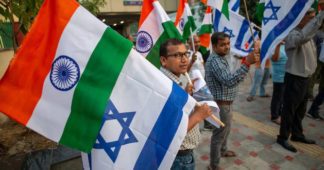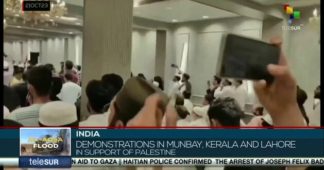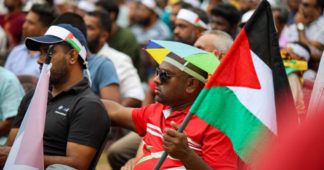Israel’s Brutality Is Stoking the Imagination of India’s Far Right
As the genocide in Gaza continues, India’s Prime Minister Narendra Modi is taking notes.
By Aparna Gopalan*
On October 12, as Israeli airstrikes were pummeling Gaza, Israel’s ambassador to India, Naor Gilon, told Asian News International that he had received such an outpouring of support from people in India that he could fill another Israeli army just with Indian volunteers. “Everyone is telling me, ‘I want to volunteer, I want to fight for Israel,’” he said.
Gilon’s remarks came five days after Hamas militants’ attack on Israel claimed 1,200 lives (a number Israel revised down from the initial 1,400); Israel’s response has been an ongoing, genocidal bombing campaign, which killed more than 10,000 Palestinians in Gaza in its first month. Within hours of the Hamas attack, Narendra Modi, India’s far-right prime minister, expressed solidarity with Israel, and ministers throughout his party echoed him, many proclaiming that India and Israel share a common struggle against “terrorism.” Meanwhile, Indian media has inundated hundreds of millions of viewers with relentless pro-Israel coverage, and India’s social media users have created such a flood of anti-Palestinian fake news that the cofounder of an Indian fact-checking nonprofit declared India “the disinformation capital of the world.”
This fever pitch of pro-Israel sentiment among right-wing Indians has deep historical roots. As journalist Azad Essa explains in his new book, Hostile Homelands, the movement to establish India as a Hindu-supremacist homeland — known as Hindutva — has long seen Israeli Zionism as a kindred struggle. Both ethno-nationalist movements draw inspiration from 20th-century European fascism, as well as each other. In a 1923 tract, Hindutva cofounder Vinayak Savarkar wrote, “if the Zionists’ dreams are ever realized — if Palestine becomes a Jewish state — it will gladden us almost as much as our Jewish friends.”
For most of the 20th century, the Hindutva movement struggled to gain a following and its fervor for Israel did not influence Indian politics. Instead, India officially sided with Palestinians. In 1938, Mohandas Gandhi wrote that the Zionist displacement of Palestinian Arabs “cannot be justified by any moral code of conduct.”
In the past four decades, however, Hindu nationalism has become the dominant political ideology in India, and the country’s support for Zionism has risen in tandem. Essa documents this rapid change: In 1991, India revoked its vote on a United Nations resolution that called Zionism racist. In 1992, India established full diplomatic ties with Israel. By the 2000s, Israel was supplying more arms to India than to the Israeli army; under Modi, who took office in 2014, India’s already copious Israeli arms imports rose by 175%. Undergirding these warming ties has been Islamophobia, increasingly rampant in both countries. By 2003, one Jewish Democratic member of the U.S. Congressional Caucus on India and Indian Americans bluntly said that India, Israel and the United States are “drawn together by our joint fight against mindless, vicious, fanatic, Islamic terrorism.”
India’s embrace of Israel also attests to how Israel has become a model for repressive governments and far-right movements worldwide, including in Italy, Hungary, Brazil, the Philippines and the United States. As early as Israel’s victory in the 1967 Six-Day War, Essa writes, Indian politicians privately expressed hopes of emulating Israel’s military might. By 2004, those aspirations became overt, as India constructed an Israel-style fence around the Muslim-majority region of Kashmir. Since then, India has not only used Israeli drones, rifles, surveillance systems, fighter jets, bombs and cybersecurity in its occupation of Kashmir, but has trained its security forces in Israel and borrowed Israeli tactics, such as “surgical strike” raids.
Beyond drawing military inspiration, Hindu nationalists are watching the Israeli political model writ large as they develop a parallel apartheid system to disenfranchise Indian minorities. A recent Indian law that eases the path for Hindu migrants to gain Indian citizenship mirrors Israeli laws privileging Jewish citizenship applications. Indian efforts to create a population registry for minorities similarly echo Israel’s control over Palestinians’ legal status. In 2019, shortly after India unilaterally dissolved Kashmir’s statehood and effectively deprived Kashmiris of the right to political representation, an Indian diplomat proposed creating Israel-style settlements in the region. “We already have a model,” he said. “If the Israeli people can do it, we can also do it.”
Israel’s role as a model for far-right regimes is not accidental; it’s the explicit goal of some segments of the Zionist movement. In a recent profile of Yoram Hazony, the prominent Israeli founder of the right-wing National Conservatism movement, historian Suzanne Schneider notes how Hazony “imagines Israel as a light unto the nations — an illiberal model for the international nationalist brigade.” In fact, Hazony has already taken this doctrine to India, where he gave talks on the “virtue of nationalism” in July.
Set in this context, Israel’s ongoing bombardment of Gaza— horrifying in its own right — becomes an even more terrifying portent of further violence. In late 2022, scholars at Georgetown University assessed that — of the widely recognized delineation of the 10 stages of genocide — India has already reached the eighth step against its more than 200 million Muslims. Now, Indian army generals are reportedly studying Israel’s assault on Gaza to “quickly draw the lessons relevant to our context,” as one army source told Indian media.
“India already rejects pressure to uphold international human rights and humanitarian law in occupied Kashmir,” says Haley Duschinski, director of Ohio University’s Center for International Studies. Now, Israel’s sidelining of international law raises grave concerns “that India will follow Israel’s example by dropping the thin justifications it uses to cover its atrocities in Kashmir.” Put simply, Duschinski says, in the aftermath of October 7 in Israel, “Kashmiris are in grave danger of ethnic cleansing in the name of Indian self-defense.”
Already, India’s Hindu Right is making rhetorical use of the conflict. In late October, India’s foreign minister said that Hamas’ attack proved that “no danger is too distant anymore” because “terrorism [cannot] be contained,” warning of “the danger of metastasis.” Under the banner of preventative counterterrorism, India is cracking down on dissidents and demonizing minorities, with police already detaining dozens of pro-Palestine protesters in New Delhi.
At the national level, with India’s 2024 general election looming large, Israel’s war was immediately integrated into the Islamophobic campaign of Modi’s far-right Bharatiya Janata Party (BJP). Earlier this year, 26 Indian opposition parties formed a coalition to challenge Modi and the BJP in next year’s polls, but already the BJP has managed to use certain opposition parties’ support of Palestinian rights to charge the coalition with “supporting terror organizations and terrorism.”
And just hours after Hamas’ initial attack, the BJP released a video featuring clips of vigilante attacks that took place under the opposition’s rule, with the caption: “What Israel is facing today, India suffered between 2004–14. Never forgive, never forget …” Set to an ominous drumbeat soundtrack, the video suggests the only way to protect Indians from such attacks recurring is a BJP-led clampdown, including ground assaults against tribal militants in India’s poorest areas, airstrikes in occupied Kashmir and detentions without trial for Muslims and other minorities.
Modi has already made headway on each of these fronts. As the war on Gaza is used to inflame Islamophobic resentments worldwide, the situation in India looks poised to get much, much worse.
* APARNA GOPALAN is news editor at Jewish Currents and former story editor at In These Times. She has previously worked as a labor organizer and is trained as an anthropologist of capitalism.
We remind our readers that publication of articles on our site does not mean that we agree with what is written. Our policy is to publish anything which we consider of interest, so as to assist our readers in forming their opinions. Sometimes we even publish articles with which we totally disagree, since we believe it is important for our readers to be informed on as wide a spectrum of views as possible.











